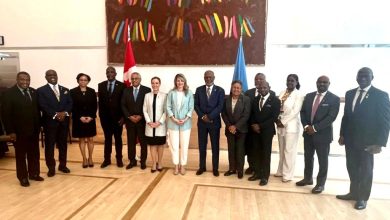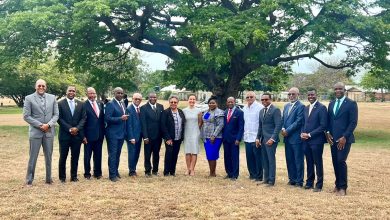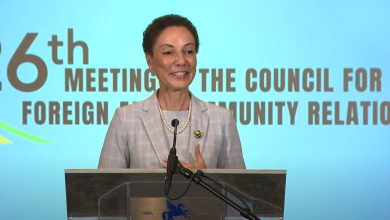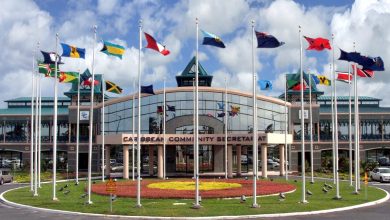COMMUNIQUÉ
The Twenty-Third Meeting of the Council for Foreign and Community Relations (COFCOR) of the Caribbean Community (CARICOM) was held virtually on the 7-8 May 2020, under the Chairmanship of His Excellency Dr. Claude Joseph, Minister of Foreign Affairs and Worship of the Republic of Haiti.
The COFCOR was attended by the Honourable E. P. Chet Greene, Minister of Foreign Affairs,Immigration and Trade of Antigua and Barbuda, Senator Dr. the Honourable Jerome Walcott, Minister of Foreign Affairs and Foreign Trade of Barbados, the Honourable Wilfred P. Elrington, Minister of Foreign Affairs of Belize, Dr. the Honourable Kenneth Darroux, Minister for Foreign Affairs, International Business and Diaspora Relations of Dominica, the Honourable Peter David, Minister for Foreign Affairs of Grenada, Dr. the Honourable Karen Cummings, Minister of Foreign Affairs of Guyana, His Excellency Dr. Claude Joseph, Minister of Foreign Affairs and Worship of Haiti, Senator the Honourable Kamina Johnson-Smith, Minister of Foreign Affairs and Foreign Trade of Jamaica, the Honourable Mark Brantley, Minister of Foreign Affairs and Aviation, St. Kitts and Nevis, the Honourable Sarah Flood-Beaubrun, Minister of External Affairs, Saint Lucia,Her Excellency Yildiz Pollack-Beigle, Minister of Foreign Affairs of Suriname and Senator the Honourable Dennis Moses, Minister of Foreign and CARICOM Affairs of Trinidad and Tobago.
The Bahamas was represented by His Excellency Reuben Rahming, Ambassador of The Bahamas to CARICOM, and St. Vincent and the Grenadines by Ms. Sandy Peters-Phillips, Permanent Secretary, Ministry of Foreign Affairs, Trade and Commerce.
OPENING CEREMONY
Opening Remarks were delivered by the Assistant Secretary-General, Foreign and Community Relations, Ambassador Colin Granderson, on behalf of the Secretary-General of the Caribbean Community, Ambassador Irwin LaRocque, the Honourable C. Peter David, Minister of Foreign Affairs and Labour of Grenada, outgoing Chair of the COFCOR, and His Excellency Dr. Claude Joseph, Minister of Foreign Affairs and Worship of the Republic of Haiti and Chair of the COFCOR.
They highlighted various challenges facing the Community, which have been compounded by the multi-faceted negative impact of the COVID-19 pandemic. They underscored the critical role of the Council for Foreign and Community Relations as the forum in which CARICOM Ministers of Foreign Affairs have the opportunity to jointly reflect and deliberate on regional, hemispheric and international matters of importance to the Community, and to agree on coordinated foreign policy positions. They all spoke of the necessity to be unified as a region on matters of critical importance, in particular in response to the global pandemic and the economic devastation that has ensued. In this regard, they paid tribute to the regional institutions – the Caribbean Public Health Agency (CARPHA) and the Pan-American Health Organisation (PAHO) – and the front-line workers fighting the pandemic.
The speeches can be accessed at www.caricom.org.
CANDIDATURES
The discussions on candidatures are an important facet of CARICOM foreign policy coordination. The COFCOR reiterated the importance of CARICOM’s participation in international decision and policy-making bodies, including through the pursuit of increased CARICOM representation in these organisations. In this regard, Ministers considered and endorsed a number of CARICOM candidatures to the United Nations (UN) and other international and regional organisations. They also deliberated on the requests from Third Countries for CARICOM’s endorsement of their candidates to these bodies.
BILATERAL RELATIONS
The Council for Foreign and Community Relations reviewed its relations with both its traditional and more recent partners and discussed ways and means by which these relations could further be strengthened. The COFCOR also reflected on the need to engage new partners with a view to promoting an appreciation of the Community’s interests and catalyzing new development platforms.
Particular attention was paid to developments, such as BREXIT and the negotiation of the successor to the Cotonou Agreement, which are having a profound impact on the nature of existing relationships, hence the focus on relations with the UK in its new dispensation and the European Union (EU).
In view of the adverse impact of COVID-19 on the conduct of international relations and given that a global response is indispensable to confront global challenges, the COFCOR exchanged views on the best options available to treat with the fallout from the pandemic. They noted the continuing erosion of multilateralism as many States have adopted a “country-first” posture in reaction to the pandemic. They however acknowledged that initiatives had been taken to offset the lack of global leadership and expressed appreciation for those of the UN Secretary General, addressing the unique challenges of Small Island Developing States (SIDS). They also lauded the EU’s efforts to mobilise financial support for global research into the novel coronavirus through the hosting of the Coronavirus Global Response Pledging Conference held virtually on 4 May 2020 and commended the vital role played by the World Health Organisation (WHO) in the international fight against the pandemic.
Foreign Ministers were called upon to support the advocacy efforts initiated by the Chairperson of CARICOM outlining the Community’s position vis-à-vis accessing assistance to meet the fiscal challenges arising from the pandemic.
Appreciation was also expressed to international development partners which have provided support in various forms to the Community in its fight against the virus.
With the Seventh CARICOM-Cuba Summit scheduled to be held in Cuba in December 2020, the COFCOR received an update on the status of relations. The COFCOR paid tribute to the Government and People of Cuba for the provision of public health personnel to boost the Region’s limited capacity in the face of the spread of the Coronavirus pandemic despite the country’s own challenges aggravated by enhanced US sanctions. Foreign Ministers called for an immediate and unconditional lifting of the US economic, commercial and financial embargo against Cuba.
Foreign Ministers made reference to the deepening of relations with Latin America and noted the recent re-energising of ties with several Latin American countries which had become dormant over time. They acknowledged the need for the wider region to share experiences and best practices in response to the pandemic and the resulting coordination meetings under the umbrella of the Organisation of American States (OAS), the Community of Latin American and Caribbean States (CELAC) and the Association of Caribbean States (ACS). Foreign Ministers acknowledged the need for the Community to be more strategic in its engagements with Latin America.
CARICOM Foreign Ministers highlighted the recent developments in the relations between CARICOM and Africa underpinned by reciprocal official visits of CARICOM Prime Ministers and African Presidents which have brought the two regions closer. They expressed regret over the postponement of the proposed CARICOM-African Union Summit in June 2020 owing to the spread of the COVID-19 virus. Initiatives for enhancing relations between the Community and Africa were also explored. In this regard, the COFCOR welcomed the provision of office space for CARICOM diplomatic representation in Nairobi by Kenya. The establishment of an Africa Group-CARICOM Caucus (AfCAR) Collaboration Initiative at the United Nations, New York, was welcomed and endorsed.
COFCOR ENGAGEMENT WITH THIRD STATES
In accordance with its traditions, the COFCOR engaged with the Foreign Ministers of two third states – Norway and Canada. The engagements provided the opportunity to exchange views on matters of mutual interest and for the COFCOR to express appreciation for the supportive voice and cooperation assistance provided by both states over the years. Foreign Ministers also voiced their deep concern over the multifaceted impact of the COVID-19 pandemic. They sought the continued advocacy of these partners in support of CARICOM’s representation to the international financial policymaking bodies to review their eligibility criteria which bar access to development assistance, grants and concessional financing. These financial resources would be invaluable at this moment of deep economic recession to fight the pandemic and underwrite recovery.
BLACKLISTING
The COFCOR rejected the arbitrary and unilateral imposition of blacklisting by the EU on several Member States of the Community. They expressed concern over the constant shifting of goal posts, the continued lack of prior consultation or notification and the unwillingness to take into account the efforts at compliance made by CARICOM Member States. The measure was viewed as detrimental to the economies of the affected states which are already in recession. The Community called on the EU to take into consideration the disproportionate impact of the COVID-19 pandemic on the economic wellbeing of the small states of CARICOM in their policy-making.
MULTILATERAL AND HEMISPHERIC RELATIONS:
United Nations (UN)
Foreign Ministers took note of the long-term implications of COVID-19 for the economies of Small Island Developing and Low-Lying States and the context in which these implications should be addressed through important UN initiatives such as the SAMOA Pathway, Financing for Development and the realisation of the UN 2030 Agenda for Sustainable Development (SDGs). They commended the attention being paid by the UN Secretary General and UN agencies such as the Economic Commission for Latin America and the Caribbean (ECLAC) to the issues of indebtedness and access to concessional financing of SIDS and Middle Income Countries which have become obstacles to the development of these countries as well as to their post-pandemic recovery, a situation exacerbated by the economic and financial ravages of the pandemic.
Organisation of American States (OAS)
The COFCOR received an update on the issues of interest to the Community before the OAS. Ministers underlined the critical importance of the development pillar of the organisation at this point in time and stressed the need for CARICOM to leverage its influence at the OAS by speaking with one voice.
Community of Latin American and Caribbean States (CELAC)
The COFCOR commended the re-energising of CELAC since the assumption of the Presidency Pro Tempore (PPT) for 2020 by Mexico and expressed satisfaction with the CELAC technical meetings of experts on the COVID-19 pandemic and the convening of the Ministerial Meeting with China. Ministers renewed their commitment to the activities of this integration process which has helped to build bridges between the Region and Latin America.
Association of Caribbean States (ACS)
CARICOM Foreign Ministers commended the coordination activities taking place within the ambit of the ACS, in particular the revival of inter-Secretariat meetings, and the coordination meetings addressing COVID-19. They also noted the coming changes of leadership at the organisation which brings together the countries of the Greater Caribbean, another important link to Central and Latin America.
The COFCOR agreed that the Community should continue to highlight the importance of the Caribbean Sea Initiative and the Caribbean Sea Commission and stressed the need for continued engagement and active participation in the work of the ACS.
The COFCOR expressed its appreciation to Dr June Soomer for the invaluable work she has done during her tenure as Secretary-General which ends in July of this year.
Commonwealth
Ministers regretted the understandable postponement of the Commonwealth Heads of Government Meeting (CHOGM) which was due to be held in Rwanda in June 2020. The Community was looking forward to addressing issues of interest and concern with their Commonwealth counterparts. This forum has always been viewed as a valuable opportunity for exchanging views with members of the G7 and G20 which play an influential role in shaping global economic and financial affairs. This would have been opportune, given the present need for the support required by CARICOM states whose economies have been decimated by the pandemic. This forum is also of significance because of the importance it has ascribed traditionally to the situation of small states.
BORDER ISSUES
Belize – Guatemala Dispute
The COFCOR received an update on the recent developments between Belize and Guatemala. The COFCOR welcomed the submission of the case arising from Guatemala’s claim to the International Court of Justice (ICJ) for final and definitive resolution, in accordance with the Special Agreement to Submit Guatemala’s Claim to the ICJ. They further noted that the ICJ had extended the time-limits for the filing of the initial pleadings.
Pending a resolution of the case before the ICJ, the COFCOR urged Belize, Guatemala and the OAS to respect and implement fully the Confidence Building Measures as agreed under their Framework Agreement of 2005. They further called on both countries and the OAS to redouble their efforts to engage in the design and development of a mechanism of cooperation for the Sarstoon River, which remains outstanding.
The COFCOR reiterated its support for the crucial role of the OAS in the process aimed at resolving the dispute, arising from Guatemala’s claims on Belize, and called on the international community to continue supporting the OAS Office in the Adjacency Zone.
The COFCOR reaffirmed its unwavering support for the sovereignty, territorial integrity and security of Belize.
Guyana-Venezuela Controversy
CARICOM Foreign Ministers received an update on the most recent developments between the Cooperative Republic of Guyana and the Bolivarian Republic of Venezuela.
Ministers noted that Guyana was to have presented its case in oral pleadings scheduled for the week of 23 March 2020 as to why the ICJ was properly vested with jurisdiction by the United Nations Secretary-General under the Geneva Agreement 1966 for a final resolution to the controversy between Guyana and Venezuela. Ministers further noted that the oral pleadings had to be postponed by the Court due to the global pandemic caused by COVID -19.
Ministers reiterated the Community’s full support for the judicial process that is intended to bring a peaceful and definitive end to the long-standing controversy between the two countries. They further reiterated their firm and unswerving support for the maintenance and preservation of the sovereignty and territorial integrity of Guyana.
FINDING COMMONALITY ON SENSITIVE SOCIAL ISSUES
Foreign Ministers underscored the importance of maintaining a coordinated position in multilateral fora on sensitive social issues which have become quite contentious during discussions at the UN. They agreed on the importance of determining CARICOM’s core positions on these issues.
STRENGTHENING CARICOM ELECTION OBSERVATION
The COFCOR recognised the importance of CARICOM Election Observation Missions (CEOMS) in promoting and maintaining the Community’s democratic values. They noted the challenges that currently exist in assembling missions and examined ways in which the process could be improved. The COFCOR agreed that the Declaration of Principles for International Election Observation and the Code of Conduct for International Election Observers should be adopted.
SYMBOL OF CARICOM
The COFCOR considered and agreed, in principle, to a proposal for the CARICOM Standard, the symbol of the Caribbean Community, to be displayed along with the national flag at all the Diplomatic and Consular Offices of CARICOM Member States.
*****
11 May 2020







